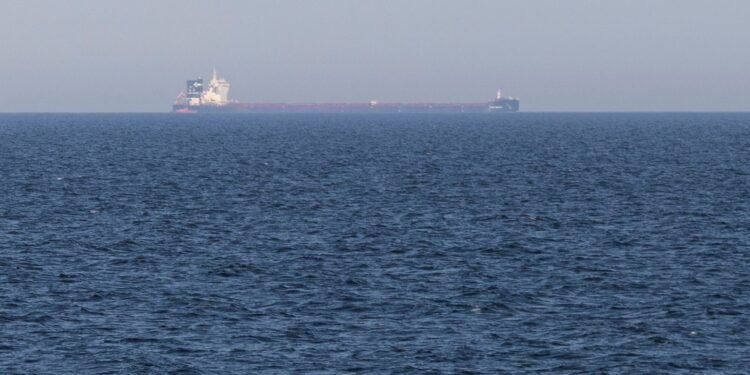The deal, announced by the US after talks in Riyadh, could lead to a halt in fighting in the Black Sea. But Russia has demands first.
The United States has agreed to help Russia boost its agricultural and fertiliser exports to the world market in exchange for a maritime security deal in the Black Sea.
The White House and the Kremlin announced the deal on Tuesday after teams from the US and Russia met in Saudi Arabia to carve out a pathway towards peace in Ukraine.
These negotiations came amid the Trump administration’s push to end the war in Ukraine that has been dragging on since 2022. President Donald Trump shifted US policy on Ukraine by proactively engaging with Moscow and accepting some of its biggest demands, including ruling out Ukraine’s NATO membership.
Here is what the latest deal is about:
A statement released by the White House on Tuesday said Ukraine and Russia had agreed to stop the use of force and the military use of commercial vessels in the Black Sea.
The Kremlin issued a statement echoing this, adding that the US and Russia would organise “appropriate control measures through inspection of such vessels”, without specifying what these measures would be.
In return, the US will “help restore Russia’s access to the world market for agricultural and fertilizer exports, lower maritime insurance costs, and enhance access to ports and payment systems for such transactions”, the White House statement said.
But the Kremlin statement was more specific in terms of Russia’s demands: It added that the pause on fighting in the Black Sea would come into force only after sanctions are lifted from the Russian agricultural bank, Rosselkhozbank, alongside other financial organisations which work with international food trade, including that of fish products and fertilisers. The Kremlin statement added that these organisations must be connected to the SWIFT system and any sanctions and restrictions on food, fertiliser, ships and agricultural machinery must be lifted.
The statements said the US and Russia “welcome the good offices of third countries with a view toward supporting the implementation of the energy and maritime agreements”. While the statements did not mention any specific countries, Turkiye has previously mediated a Black Sea grain deal, and India has helped convince Russia to stick with it.
Both the White House and Kremlin statements said Washington and Moscow would “develop measures” to implement an earlier agreement between Trump and Russian President Vladimir Putin over a phone call on March 18 to halt attacks on Russian and Ukrainian energy infrastructure.
This agreement was accepted by Ukrainian President Volodymyr Zelenskyy. But as in the past, details remain vague. The latest US and Russian statements do not specify the “measures” that would lead to a halt in attacks on energy infrastructure. Since this agreement, Russia and Ukraine have accused each other of attacking energy infrastructure.
The Kremlin statement added that there is a possibility of “extension and withdrawal from the [ban on energy strikes] agreement in the event of non-compliance by one of the parties”.
From March 23 to 25, a delegation from the US met separately with Russian and Ukrainian teams in Saudi Arabia’s capital Riyadh.
What is the Black Sea deal about?
The Russian delegation was led by diplomat Grigory Karasin, who has previously been deputy foreign minister and ambassador to the United Kingdom. Alongside Karasin, the Russian team also included Sergei Beseda, a veteran of Russia’s Federal Security Service (FSB). The Ukrainian delegation was led by Ukrainian Defence Minister Rustem Umerov and Pavlo Palisa, a top military adviser to Zelenskyy.
The Reuters news agency reported that the US team included White House National Security Council’s senior director, Andrew Peek, and Director of Policy Planning Staff Michael Anton, citing a source briefed on planning for the talks in Riyadh.
In 2023, Moscow pulled out of this deal, citing difficulties and hurdles in exporting its own food and fertilisers. While Russian food and fertiliser companies are not the target of Western sanctions, Moscow said restrictions on logistics, payments and insurance fees had hindered shipping.
In advance of the talks in Riyadh, Waltz told CBS News on March 23 that the resumption of the grain deal would be the main focus of the talks. “We are now going to talk about a Black Sea maritime ceasefire so that both sides can move grain, fuel, and start conducting trade again in the Black Sea,” he said.
In his nightly video address posted to his X account on Tuesday, Zelenskyy said, “Ukraine is ready to work as swiftly as possible and with absolute transparency to end the war.”
However, he expressed distrust in Moscow, saying: “There is something that the Kremlin is lying about again: that allegedly the silence in the Black Sea depends on the issue of sanctions, and that allegedly the start date for the silence in the energy sector is March 18.”
“If there is renewed military activity in the Black Sea, if Russian manipulations and threats continue — then new measures will need to be taken, specifically against Moscow,” Zelenskyy said.
Ukrainian Defence Minister Umerov said further discussions were needed to iron out the details of the Black Sea deal.
“The Ukrainian side emphasizes that all movement by Russia of its military vessels outside of Eastern part of the Black Sea will constitute violation of the spirit of this agreement, will be regarded as violation of the commitment to ensure safe navigation of the Black Sea and threat to the national security of Ukraine,” Umerov wrote in an X post on Tuesday. He added that in this scenario, Ukraine “will have full right to exercise right to self-defense”.
“For the effective implementation of the arrangements, it is important to hold additional technical consultations as soon as possible to agree on all the details and technical aspects of the implementation, monitoring and control of the arrangements,” Umerov wrote.
John E Herbst, a senior director at the Washington, DC-based think tank Atlantic Council, called the deal a “useful step, but not a major one” in an analysis published on its website. This is because the Black Sea has in any case not seen major military activity after Ukrainian naval drones chased the Russian Black Sea Fleet out of Crimea, he added.
On the other hand, Matthew Kroenig from the Atlantic Council wrote that the announcement was “a step toward circumscribing the conflict on the road to eventual peace”.
Daniel Fried, the Weiser Family distinguished fellow at the Atlantic Council, had a different view, however.









 United Arab Emirates Dirham Exchange Rate
United Arab Emirates Dirham Exchange Rate

